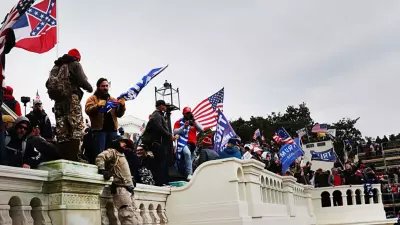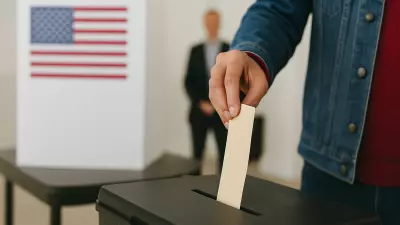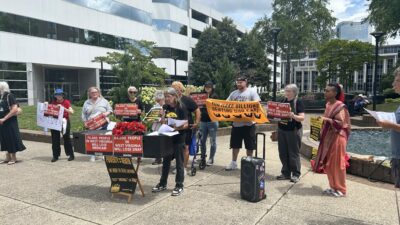With Ohio’s primary elections around the corner, there’s been a notable rise in January 6 conspiracy theorizing among a handful of the state’s Republican candidates. Some peddle the idea that FBI informants provoked an otherwise peaceful crowd. Others, that those convicted of crimes are hostages or political prisoners. Still others suggest investigators are covering up information about pipe bombs left at the Republican and Democratic National Committee headquarters.

It follows a steady campaign by lawmakers like Ohio Republican U.S. Rep. Jim Jordan and conservative media figures to downplay the event and cast doubt on those investigating it. Jordan, for instance, argued the bipartisan January 6 committee’s chief goal was to discredit the conservative political movement. Ohio Republican U.S. Rep. Max Miller suggested the committee was intended as a distraction from the withdrawal from Afghanistan while Ohio Republican U.S. Rep. Warren Davidson argued it was attempting to “criminalize political differences.”
Similarly, Ohio Republican U.S. Sen. J.D. Vance has called the January 6 committee a “farce” that was “more interested in political revenge than the truth.” He also criticized the sentences for three January 6 offenders, “many of whom aren’t even accused of violence,” when a man got less time for voluntary manslaughter.
I would like to hear a single good argument for why a violent criminal who killed an innocent father deserves less time than these J6 offenders, many of whom aren’t even accused of violence. https://t.co/gpiYHeKdj4
— J.D. Vance (@JDVance1) September 3, 2023
The three offenders Vance referenced were former leaders of the Proud Boys, and all three, in fact, took part in the violent assault on the U.S. Capitol. Joe Biggs, Zachary Rehl and Ethan Nordean were intimately involved in planning and recruiting before the riot, and were convicted of seditious conspiracy alongside Proud Boys leader Enrique Tarrio.
According to the indictment, they tore down barricades and fencing, led people into the building, and fought through officers trying to defend the building. The judge in the case applied the terrorism enhancement when he handed down their sentences.
Still, the efforts to redefine the January 6 riot show up in recent polling suggesting a quarter of Americans believe the FBI instigated the riot. And with some candidates pushing conspiracy theories as part of their campaign, those ideas are only getting reinforced.
What are candidates saying?
Perhaps Ohio’s most strident voice on January 6 has been Vivek Ramaswamy. The Columbus-area businessman and author ran for the Republican presidential nomination but dropped his bid after finishing fourth in the Iowa caucuses.
Last July during a Turning Point Action conference, Ramaswamy blamed January 6, on a “culture of censorship.” Demonstrators shouldn’t be blamed for lashing out, he argued, after a litany of perceived abuses from COVID lockdowns to the ‘suppressing’ of Hunter Biden’s laptop.
“When you tell people they cannot speak, that is when they scream,” he insisted. “And when you tell people they cannot scream, that is when they tear things down.”
By December of last year, however, Ramaswamy had moved from excusing rioters to positing that “January 6 now does look it was an inside job,” on a presidential debate stage. On the riot’s anniversary, Ramaswamy took to social media with ten “truths” about January 6, referring to it with the hashtag “EntrapmentDay.”
As the fact-checking website PolitiFact has reported, there’s some evidence the FBI had confidential informants present at the rally. However, there has been no evidence to suggest those individuals provoked the mob.
For instance, the former FBI Washington field office assistant director, Steven D’Antuono, who acknowledged the presence of a “handful” of informants, also rejected the idea that they instigated violence as the “furthest from the truth.”
In testimony on Capitol Hill, last November FBI director Christopher Wray reiterated the point forcefully.
“If you are asking whether the violence at the capital on January 6 was part of some operation orchestrated by FBI sources or agents,” he told U.S. Rep. Clay Higgins, R-LA, “the answer is an emphatic no.”
Stop vilifying half of your fellow citizens. Doing so only makes the divisions that need to be healed worse. The morons who ransacked the capital don’t represent anyone but the mentally unstable.
— Bernie Moreno (@berniemoreno) January 7, 2021
In Ohio’s U.S. Senate race, Republican Bernie Moreno has attempted to draw a distinction among those at the capitol. As it was happening, he criticized the rioters on social media, but also equated their actions to protests the previous summer after the killing of George Floyd.
But in a recent debate, moderators pressed him about more recent comments describing people facing charges or convicted for their role on January 6 as political prisoners. Moreno said the people “who broke windows, who damaged personal property” are criminals, but many of those facing charges were merely trespassing.
“They’ve been stripped of their due process,” Moreno insisted. “These are moms. These are grandmothers that were wandering the Capitol. Now were they trespassing? Sure, but we treat trespassers in a certain way.”
PolitiFact has rated the idea that defendants were only trespassing as pants on fire. One of Moreno’s competitors, state Sen. Matt Dolan, R-Chagrin Falls, seized on Moreno’s equivocation, calling it an “absolute political phony answer.”
“He’s trying to reinvent himself,” Dolan said.
Down ticket conspiracy theories
In Ohio’s 2nd Congressional district, Republican Derek Myers picked up the ‘false flag’ conspiracy theory and ran with it. In a video, he claimed to have been an FBI confidential informant between 2017 and 2020, and that agents approached him about attending the January 6 rally.
Myers stated he had evidence to back up his claims, but when Ohio Capital Journal requested a copy Myers refused.
Republican statehouse candidate Dillon Blevins echoed the conspiracy theory about FBI provocateurs in a recent interview.
“The January 6 insurrection, it came out that FBI operatives were within the crowds, and leading them into the building, into the Capitol,” he said.
Ohio Capital Journal reached out to Blevins’ campaign for comment, and he responded, “TRUMP 2024.” In a Facebook post responding to Ohio Legislative Watch highlighting his statements, Blevins said, “I stand by every word.”
In Northwest Ohio, Republican congressional candidate J.R. Majewski has repeatedly referred to the people convicted of crimes connected with January 6 as “hostages” or “political prisoners.”
“Now that (U.S. House Speaker Mike Johnson) has released the J6 tapes,” he said last November, “the Biden DOJ should release the hostages.”
In 2022, as a group calling itself a ‘freedom convoy’ prepared to drive across the U.S. toward Washington D.C. Majewkski urged them to turn the Washington D.C jail’s parking lot into “the worlds largest peaceful protest.”
“STOP GOVERNMENT OVERREACH – RELEASE POLITICAL PRISONERS!” he wrote.
Majewski himself was at the Capitol on January 6 and he has repeatedly downplayed the violence. This year on the anniversary of the riot he posted a selfie taken that day with the Capitol dome in the background. The post reads “J6 was #notaninsurrection.”
Majewski’s campaign didn’t respond to a request for comment.
What to make of it?
In the immediate aftermath of January 6, repudiation of the riot was near universal. Even U.S. Rep. Jordan, who’d spent the past two months fanning the flames of stolen election rhetoric, said “what happened today is wrong and not what America is about.” By January 9, Jordan was insisting, “’unity and healing’ doesn’t happen with cancel culture and impeachment.”
“The problem is that Trump has a huge base of supporters, and they turn to him for explanations of what went wrong, or what happened that day,” Ohio State University sociologist Laura Dugan explained.
And at every turn, Trump has downplayed the violence and his role instigating it while shifting blame to those whom he falsely claims ‘stole’ the election.
Americans support peaceful protests, First Amendment activity, and the men and women of law enforcement.
What happened today is wrong and is not what America is about.
— Rep. Jim Jordan (@Jim_Jordan) January 6, 2021
Dugan, who studies extremism as part of Ohio State’s Mershon Center of International Security Studies, said Republican politicians generally fall into three camps when it comes to January 6. There are those who readily embrace his positions — in effect, trying to draft on his electoral slipstream. Others keep statements vague and offer just enough support to avoid Trump’s rebuke. And lastly there’s the increasingly rare breed who reject Trump’s line.
“There’s been plenty of examples of people who spoke up against what happened on January 6, then lost their office or were voted out,” Dugan said.
Ohio State political scientist Paul Beck came to a similar conclusion. Trump’s version of events on January 6 has become something approaching a litmus test within the party, Beck said.
“I think any Republican candidate who attempts to criticize what happened on January 6, and would associate Trump as at least somebody behind what happened, is going to incur the wrath of Trump himself,” Beck said.
Beck said “clearly” the prevalence of January 6 rhetoric is picking up pace. In part because “Trump himself is beating the drum even harder,” now that he’s campaigning, but also because GOP candidates have their own primary elections looming. As with any primary election, Beck said, the electorate is smaller and more extreme.
And Dugan argued it’s remarkably easy for Trump’s version of events and the associated conspiracy theories to spread. She explained public discourse, on platforms like X or Facebook, is a kind of collective storytelling, in which every iteration builds on the last.
“Even when they’re joking about something,” she said, “It spreads the narrative.”
“There’s people who are making jokes about what happened on January 6, (and) those jokes are taken and run with as if they were truth,” she added. “And so, these little kernels of ideas that seem ridiculous just get spread very quickly.”
In terms stakes, Dugan said January 6 might be moot if abortion, an issue that hasn’t been kind to Ohio Republicans lately, proves more salient. And she notes 2022 saw many Republican candidates around the country who claimed the 2020 presidential election was stolen. Most of those candidates lost, but notably, not Ohio’s J.D. Vance.
“I wouldn’t conclude that the majority of people in Ohio believe the narrative that January 6 was a legitimate thing, or that these people are political prisoners,” Dugan said. “I wouldn’t. I don’t think that’s true.”
But she warned many of the contests on the ballot aren’t up to the majority of Ohioans — they’re up to people registered to vote in a given district. And many of those districts favor one party so heavily that the election is, in effect, decided in the primary. Would voters reject a candidate for parroting a bogus party line?
“Probably not?” Dugan said. “Because, you know, they are going to vote probably for the party that they’re affiliated with, and the state is very gerrymandered.”
Nick Evans has spent the past seven years reporting for NPR member stations in Florida and Ohio. He got his start in Tallahassee, covering issues like redistricting, same sex marriage and medical marijuana. Since arriving in Columbus in 2018, he has covered everything from city council to football. His work on Ohio politics and local policing have been featured numerous times on NPR.
Zurie Pope is a student at the University of Cincinnati and a reporter. His work has appeared in The Nation Magazine, the Washington Blade, the Cincinnati Enquirer, and his school newspaper, The News Record. His work focuses on the influence of moneyed interests on politics, LGBTQ+ issues, and domestic extremism.
The Ohio Capital Journal is an independent, nonprofit news organization dedicated to connecting Ohioans to their state government and its impact on their lives. The Capital Journal combines Ohio state government coverage with incisive investigative journalism, reporting on the consequences of policy, political insight and principled commentary.







